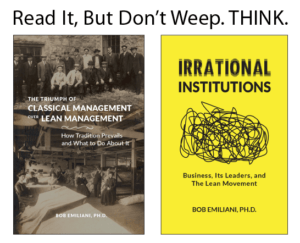Those of us who are fans of Toyota’s management system (TMS) and Lean management (LM) are a curious bunch. We want to learn as much as we can as fast as possible. We want to know the details of TMS and LM and how to make them work in ways that fulfill our understanding and our expectations. We are voracious consumers of information that will help satisfy our intellectual appetites and practical needs. By we, I mean professional salaried staff. Lean has proven to be far less appealing to laborers and executives.
In most cases, our interest in TMS and LM is not shared throughout the organizational hierarchy. And we struggle to gain consistent understandings of fundamentals such as kaizen, standard work, and flow. Value stream maps, A3 reports, and other methods and tools remain widely misunderstood and misused. The pace of process improvement that is necessary for remaining competitive in free markets is also misunderstood. The continuous improvement clock tells time in days or weeks, not months or years.
While rich in substance, TMS and LM are pitifully weak in terms of their fundamental appeal to the top leaders of organizations and society at-large. TMS and LM are niche-of-a-niche interests within the much larger fields of leadership and management that remain dominated by tradition. Perhaps that will change someday.
The desire by professional salaried staff to know about TMS and LM are commendable. Yet the situation that I have described is basically the existence of myriad defects, despite all the good information produced over five decades — conferences, training, books, videos, podcasts, blogs, etc. It is apparent that people have had great difficulty separating the good information from the bad information. They also have difficulty putting the good information into practice. This points to another dynamic in play: a desire by leaders and laborers to perpetuate traditions and thus maintain the status quo. Leaders, of course, have vast powers to make that happen compared to laborers, so leaders must be the focal point.
The thirst for information about TMS and LM is much greater than the desire to understand how and why leaders maintain their grip to a bygone era. It is hard to believe that TMS or LM will become the common leadership and management practice if this problem is not understood and if ideas are not generated to try so that business and society can make needed progress. The preference to ignore this problem is understandable because it is complicated and uncomfortable, and solutions are not obvious or easy. Furthermore, it is not difficult to imagine that solutions could be effortlessly blocked by those in power. Yet, preferring to ignore (see examples here and here) does not solve problems.
The spirit of TMS and LM is curiosity, problem-solving, and to persist in pursuing improvement despite the obstacles that one encounters. This, coupled with the fact that neither Lean movement leaders nor the Lean community at-large is satisfied with the current state, should generate an intense desire to know what is impeding progress. The usual superficial characterizations of the impediments have proven themselves to be insufficient in terms of informing problem-solving. A deeper understanding is required, and that is what I have sought to provide in recent years.
These two books (learn more here and here) illuminate the problem in ways that have never been described before. They are deep dives into the how and why leaders maintain their grip to a bygone era. They are meant to help move the practice of TMS and LM forward, but not in the usual way. If you read the books, they will make you feel there is nothing you can do to reverse the situation. You may feel defeated and lose hope. You will feel frustrated and perhaps angry or may even cry. Go through those emotions for a day or a week or a month, but then re-focus on the task at hand. The purpose of these books is to present the ugly truth and then to stimulate your thinking so that new ideas are generated. By doing this, the opportunity is for TMS and LM to have a larger presence in business and society in the coming 50 years than they have had in the last 50 years. Preferring to ignore the ugly truth will render TMS and LM as nothing more than interesting and occasionally useful curiosities. You can help prevent that from happening.

